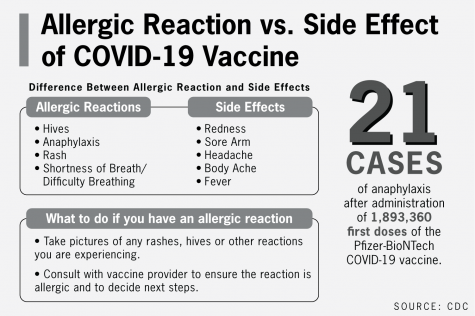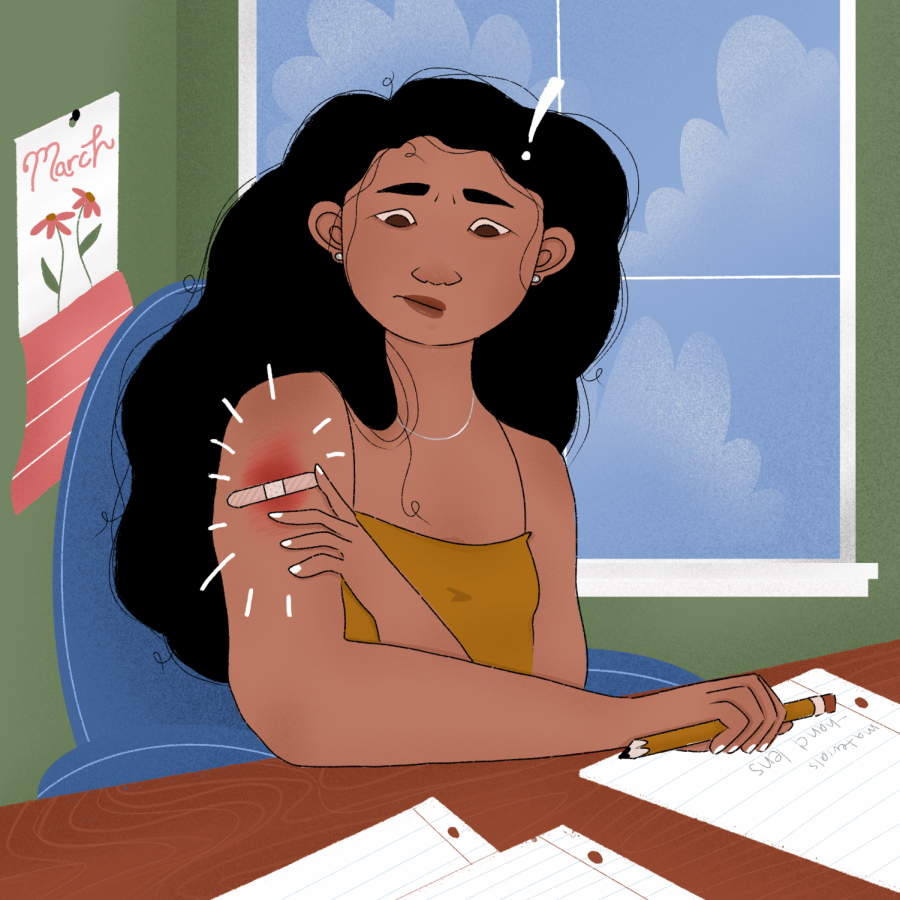UT-Austin students, faculty discuss physical reactions to COVID vaccine
April 6, 2021
After her first dose of the Pfizer COVID-19 vaccine, Kristen Schank experienced a headache, fever, chills and a rash the size of an orange just below the injection site on her left arm.
“The rash was red, hot and very itchy,” finance junior Schank said. “I was a little concerned, though not scared that I would die.”
On March 29, Texas opened up COVID-19 vaccine eligibility to all individuals 16 and older. In the United States, about 165 million COVID-19 vaccines have been administered. While it’s expected for recipients of the vaccine to experience side effects, about 2.1% have had allergic reactions.
Schank was a participant in a Pfizer vaccine trial in September. Through the trial, Schank was able to receive a vaccination in March and had a trial team monitor her reaction.
“I went in and (the trial team) looked at (the rash),” Schank said. “They said not many people experienced that (reaction), but it wasn’t to where it was causing concern. I knew as long as my throat wasn’t closing up, I’d probably be fine.”
Though her reaction was uncommon, Schank was still able to receive a second dose. She said she had faith the doctors wouldn’t be administering the vaccine if the costs outweighed the benefits.
“Discomfort for a few days is worth it to me to prevent other people from getting sick,” Schank said “It’s about saving your life and everyone else’s.”
Biology freshman Alondra Fleming-Parra got the Moderna COVID-19 vaccine because she lives with her aunt, who is at a high-risk of complications if she contracted COVID-19.
“(I) didn’t feel anything too alarming, other than the soreness of my arm,” Fleming-Parra said. “Later that day, my arm started to hurt, (and) I felt tired.”
After her second dose, she said she developed a 100.2 degree fever and began to experience flu-like symptoms.
“There was a point where I was really worried because I had never felt that (sick) before,” Fleming-Parra said. “I was just thinking, ‘My body’s working. It’s trying its best to do what it has to do.’”
Fleming-Parra said her body experienced expected possible side effects in response to the vaccine, and she did not have an allergic reaction.

Dr. Kristin Mondy, chief of the Division of Infectious Disease at Dell Medical School, said her main concern is vaccine recipients interpreting normal side effects of the vaccine as an allergic reaction.
“Soreness, fatigue, that’s not an allergic reaction,” Mondy said. “If a person is having a skin reaction … (such as) discoloration, bumps … it’s helpful to take pictures and go to the vaccine provider and talk to them about it.”
Mondy said vaccine providers will be able to verify whether someone is having an allergic reaction or just experiencing common side effects.
“(Vaccine providers) have training on the vaccinations,” Mondy said. “The provider will decide how severe (the reaction was) and if it’s safe to get the second dose.”
Around 30 minutes after receiving the Pfizer vaccine, Robert Quigley, an associate professor of practice of journalism, broke out in hives across his entire body. Because of his allergic reaction, his doctors wouldn’t allow him to receive the second dose of the Pfizer vaccine in accordance with CDC recommendations. If he were to receive the second dose, Quigley risked being sent into anaphylactic shock.
“I’m disappointed that I couldn’t get two (doses), but I’m happy I was able to get one,” Quigley said. “Not everybody is fortunate enough around the world to even get one shot … so I’m privileged.”
Though Schank, Fleming-Parra and Quigley had varying reactions to the vaccine, they all said they don’t regret their decision to get vaccinated.
“Me breaking out in hives was a minor inconvenience,” Quigley said. “I have family members who had a high temperature…that’s a minor inconvenience. It’s easy to forget just how deadly serious this virus has been and could still be.”
Editor’s Note: This article first appeared in the April 6 issue of The Daily Texan.











